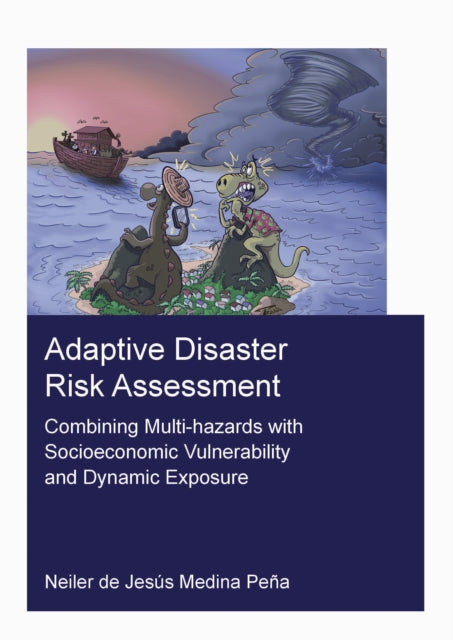NeilerMedina Pena
Adaptive Disaster Risk Assessment: Combining Multi-Hazards with Socioeconomic Vulnerability and Dynamic Exposure
Adaptive Disaster Risk Assessment: Combining Multi-Hazards with Socioeconomic Vulnerability and Dynamic Exposure
YOU SAVE £4.71
- Condition: Brand new
- UK Delivery times: Usually arrives within 2 - 3 working days
- UK Shipping: Fee starts at £2.39. Subject to product weight & dimension
Bulk ordering. Want 15 or more copies? Get a personalised quote and bigger discounts. Learn more about bulk orders.
Couldn't load pickup availability
- More about Adaptive Disaster Risk Assessment: Combining Multi-Hazards with Socioeconomic Vulnerability and Dynamic Exposure
Climate change and urbanization increase the frequency and severity of natural disasters. This dissertation proposes an Adaptive Disaster Risk Assessment (ADRA) framework that incorporates socioeconomic vulnerability and adaptive exposure associated with human behavior in extreme hydro-meteorological events in the context of Small Island Developing States (SIDS). ADRA uses an index-based approach (PeVI) to assess vulnerability and incorporates exposure through logistic regression and Agent-based models.
Format: Paperback / softback
Length: 312 pages
Publication date: 09 October 2021
Publisher: Taylor & Francis Ltd
Climate change, coupled with the rapid and often unplanned urbanization trends, is associated with a rising trend in the frequency and severity of disasters triggered by natural hazards. In order to face the impacts of such threats, it is necessary to have an appropriate Disaster Risk Assessment (DRA). Traditional DRA approaches for disaster risk reduction (DRR) have focused mainly on the hazard component of risk, with little attention to the vulnerability and exposure components. To address this issue, this dissertation's main objective is to develop and test a disaster risk modeling framework that incorporates socioeconomic vulnerability and the adaptive nature of exposure associated with human behavior in extreme hydro-meteorological events in the context of Small Island Developing States (SIDS). To achieve the objective, an Adaptive Disaster Risk Assessment (ADRA) framework is proposed. ADRA uses an index-based approach (PeVI) to assess the socioeconomic vulnerability using three components: susceptibility, lack of coping capacities, and lack of adaptation. Furthermore, ADRA explicitly incorporates the exposure component using two approaches; first, a logistic regression model was built using the actual evacuation rates observed during Hurricane Irma, and second, an Agent-based model is used to simulate how households change their exposure levels in relation to different sources of information.
Climate change, combined with the rapid and often unplanned urbanization trends, is associated with a rising trend in the frequency and severity of disasters triggered by natural hazards. In order to face the impacts of such threats, it is necessary to have an appropriate Disaster Risk Assessment (DRA). Traditional DRA approaches for disaster risk reduction (DRR) have focused mainly on the hazard component of risk, with little attention to the vulnerability and exposure components. To address this issue, this dissertation's main objective is to develop and test a disaster risk modeling framework that incorporates socioeconomic vulnerability and the adaptive nature of exposure associated with human behavior in extreme hydro-meteorological events in the context of Small Island Developing States (SIDS). To achieve the objective, an Adaptive Disaster Risk Assessment (ADRA) framework is proposed. ADRA uses an index-based approach (PeVI) to assess the socioeconomic vulnerability using three components: susceptibility, lack of coping capacities, and lack of adaptation. Furthermore, ADRA explicitly incorporates the exposure component using two approaches; first, a logistic regression model was built using the actual evacuation rates observed during Hurricane Irma, and second, an Agent-based model is used to simulate how households change their exposure levels in relation to different sources of information.
Weight: 603g
ISBN-13: 9781032116174
This item can be found in:
UK and International shipping information
UK and International shipping information
UK Delivery and returns information:
- Delivery within 2 - 3 days when ordering in the UK.
- Shipping fee for UK customers from £2.39. Fully tracked shipping service available.
- Returns policy: Return within 30 days of receipt for full refund.
International deliveries:
Shulph Ink now ships to Australia, Belgium, Canada, France, Germany, Ireland, Italy, India, Luxembourg Saudi Arabia, Singapore, Spain, Netherlands, New Zealand, United Arab Emirates, United States of America.
- Delivery times: within 5 - 10 days for international orders.
- Shipping fee: charges vary for overseas orders. Only tracked services are available for most international orders. Some countries have untracked shipping options.
- Customs charges: If ordering to addresses outside the United Kingdom, you may or may not incur additional customs and duties fees during local delivery.


